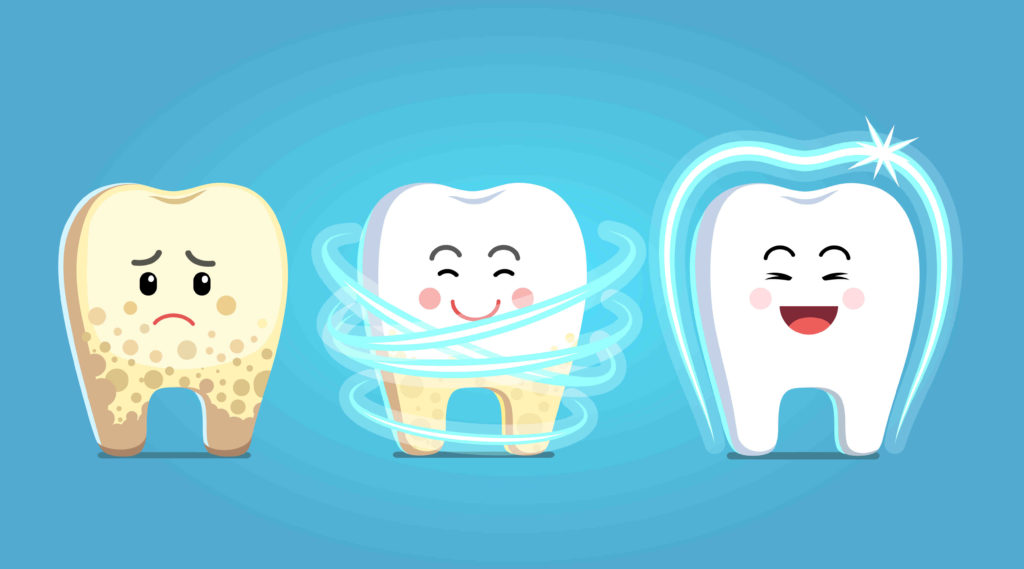Scaling at the dentist is essential for maintaining good oral hygiene and preventing oral disease. What are the risks of tartar build-up on the teeth? What are the benefits of professional scaling? We answer all your questions.
How does tartar form on teeth?
When we eat, food debris and bacteria settle on the surface of our teeth, forming a sticky substance called plaque. Over time, plaque mineralizes and turns into tartar, a hard, yellowish substance.
Tartar build-up can lead to a number of dental problems, including gum disease and tooth decay. dental caries. Tartar deposits can irritate the gums, causing inflammation and bleeding. Subsequently, bacteria present in plaque and tartar can infect the gums, leading to conditions such as gingivitis and periodontitis.
What is scaling at the dentist?
Scaling at the dentist involves removing tartar build-up from the teeth and under the gums, using special tools such as curettes and ultrasonic instruments. This process is usually performed during a routine visit to the dentist, and can be combined with a thorough oral examination to detect any dental problems. In addition to removing tartar, scaling also helps prevent future plaque build-up.
Wondering how often to have your teeth scaled? The formation of tartar varies from one person to another, depending on eating habits, oral hygiene and dental health. tobacco consumptionoral hygiene and saliva production. Saliva plays a major role in the natural cleaning of the mouth after each meal. On average, it is recommended to have a scaling once a year.
How does a scaling session work?
A tooth scaling consultation in Lausanne or Fribourg involves several steps:
- In-depth visual examination
Your dentist or dental hygienist begins with a thorough inspection of your oral cavity. He or she uses a small mirror to check the condition of your teeth and gums, and then checks the depth of gum pockets using a periodontal curette.
- Supragingival scaling
Most dental practices in Lausanne and Fribourg are equipped with ultrasonic instruments. These emit vibrations that loosen tartar from the gum line. A probe then sucks it out. It's painless in most cases. A small tube sprays water continuously into your mouth to help remove the particles. The more tartar in your mouth, the longer this operation takes.
- Interdental cleaning
There's nothing like professional interdental cleaning to get rid of the tartar that builds up between your teeth. Thanks to his expert instruments, he can dislodge the residues hidden in every nook and cranny of your teeth.
- Polishing
At the end of the session, the dentist or dental hygienist begins smoothing the surface of your teeth. This procedure, called polishing, removes any stains using a polishing machine and polishing paste. This professional treatment gives your teeth a radiant shine.
- Rinsing
Finally, the practitioner invites you to rinse your mouth with water or a fluoride solution. This removes all residues.
When should I have a thorough descaling?
These symptoms often indicate a buildup of bacterial plaque under the gums and may require deep scaling, called root planing, to clean and smooth the surface of the tooth roots.
Dentists particularly recommend scaling for people with signs of periodontal disease, such as bleeding or inflamed gums, receding teeth or persistent bad breath.
What are the benefits of dental scaling?
Scaling at the dentist plays an essential role in maintaining good dental hygiene and preventing oral disease. It removes tartar, reduces the build-up of bacterial plaque and prevents problems such as periodontal disease and tooth decay. That's why it's so important to consult your dentist regularly and follow his or her recommendations on oral hygiene to keep your teeth and gums healthy.
In addition to improving oral health, scaling can also have a positive impact on general health. Studies have shown that periodontal disease is associated with an increased risk of cardiovascular disease and diabetes. By removing bacteria and toxins from the mouth, scaling can help reduce this risk and prevent other health problems.
How can I prevent tartar build-up on my teeth?
Once teeth are free of tartar, it's important to maintain good dental hygiene at home by brushing at least twice a day with a toothbrush and appropriate toothpaste. Regular flossing and mouthwash can also help remove food debris and bacteria from between teeth and along the gum line.
We recommend an annual check-up to assess the health of your teeth. Tartar build-up can lead to bad breath and a host of other problems. HELVIDENT's three dental clinics are home to a full range of oral health professionals. We welcome you in Lausanne, Fribourg and Aigle. Don't hesitate to contact us to make an appointment.

